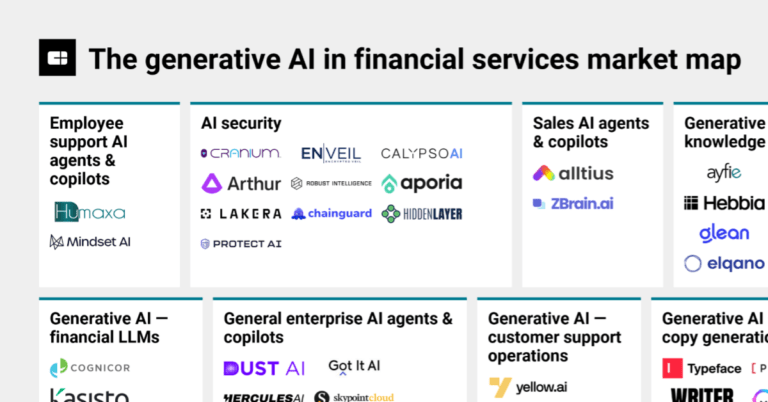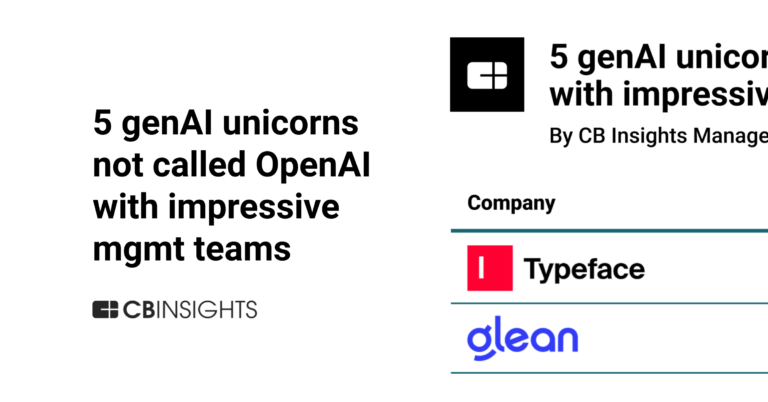
Typeface
Founded Year
2022Stage
Series B | AliveTotal Raised
$205MValuation
$0000Last Raised
$140M | 2 yrs agoMosaic Score The Mosaic Score is an algorithm that measures the overall financial health and market potential of private companies.
+11 points in the past 30 days
About Typeface
Typeface is a generative AI platform that specializes in personalized content creation for the enterprise sector. The company offers a suite of tools that streamline the content creation process, enabling businesses to produce on-brand content at an accelerated pace. Typeface primarily serves sectors that require robust content marketing strategies, such as email marketing, advertising, SEO, and eCommerce. Typeface was formerly known as Cortex6. It was founded in 2022 and is based in Palo Alto, California.
Loading...
ESPs containing Typeface
The ESP matrix leverages data and analyst insight to identify and rank leading companies in a given technology landscape.
The generative AI — marketing copy generation market offers solutions for automating and enhancing text content creation, such as articles, blog posts, social media captions, e-commerce product descriptions, and more. These solutions use natural language processing and machine learning algorithms to understand context, generate coherent and engaging text, and mimic human writers’ writing styles. B…
Typeface named as Highflier among 15 other companies, including Microsoft, Writer, and Jasper.
Loading...
Research containing Typeface
Get data-driven expert analysis from the CB Insights Intelligence Unit.
CB Insights Intelligence Analysts have mentioned Typeface in 8 CB Insights research briefs, most recently on Nov 7, 2024.
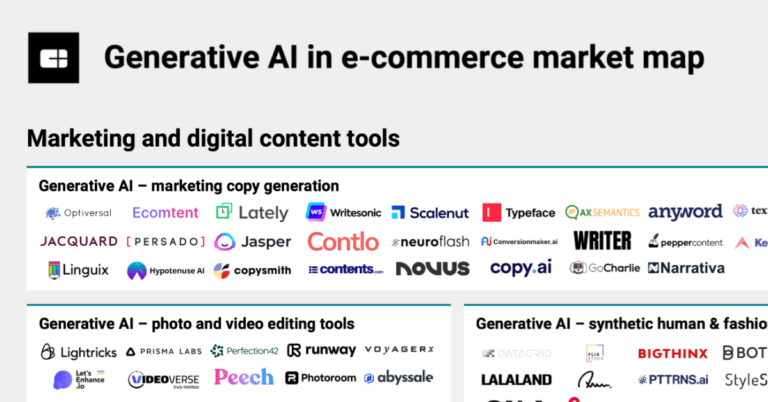
Oct 17, 2024
The generative AI for e-commerce market map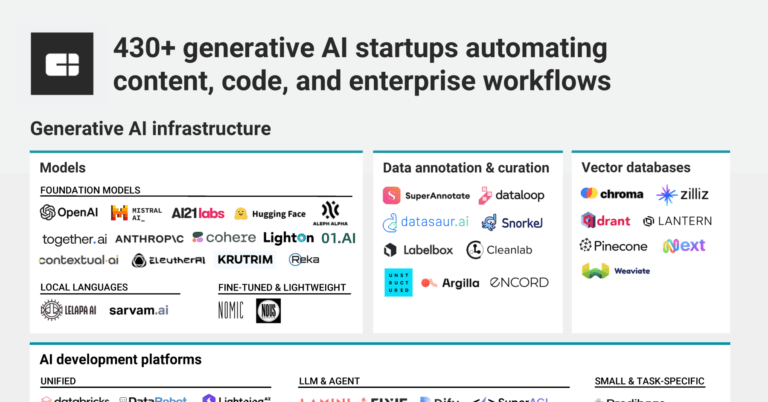
May 24, 2024
The generative AI market map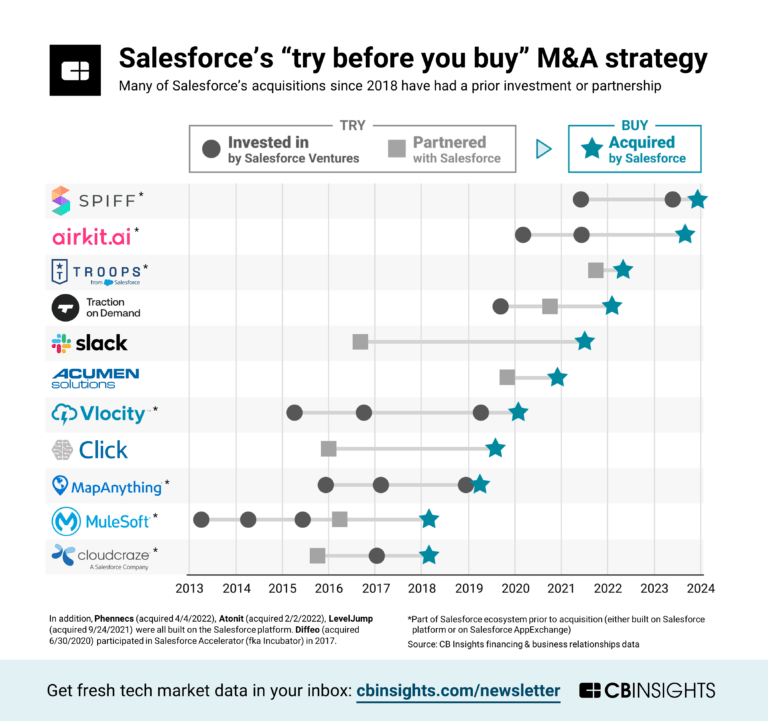
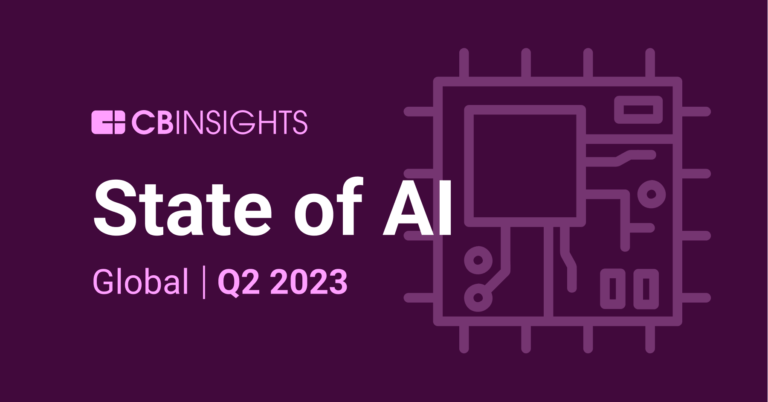
Aug 16, 2023 report
State of AI Q2’23 Report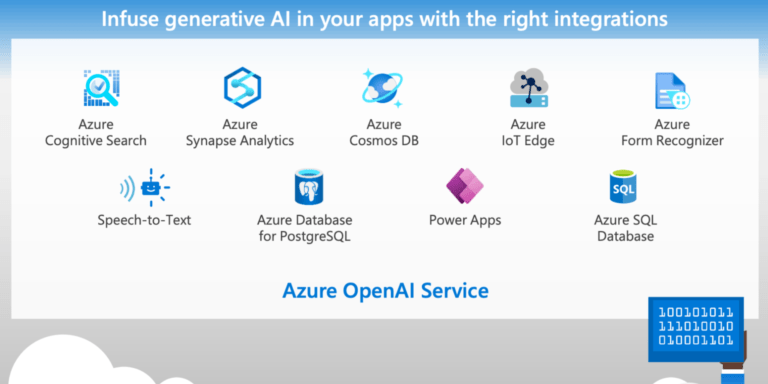
Expert Collections containing Typeface
Expert Collections are analyst-curated lists that highlight the companies you need to know in the most important technology spaces.
Typeface is included in 5 Expert Collections, including Unicorns- Billion Dollar Startups.
Unicorns- Billion Dollar Startups
1,270 items
Digital Content & Synthetic Media
1,525 items
The Synthetic Media collection includes companies that use artificial intelligence to generate, edit, or enable digital content under all forms, including images, videos, audio, and text, among others.
Generative AI
1,299 items
Companies working on generative AI applications and infrastructure.
Artificial Intelligence
7,221 items
NRF Big Show 2025: Exhibitors
959 items
Typeface Patents
Typeface has filed 5 patents.
The 3 most popular patent topics include:
- promotion and marketing communications
- rotating disc computer storage media
- artificial neural networks

Application Date | Grant Date | Title | Related Topics | Status |
|---|---|---|---|---|
7/25/2024 | 2/4/2025 | Rotating disc computer storage media, Diagrams, Promotion and marketing communications, Combat flight simulators, Social networking services | Grant |
Application Date | 7/25/2024 |
|---|---|
Grant Date | 2/4/2025 |
Title | |
Related Topics | Rotating disc computer storage media, Diagrams, Promotion and marketing communications, Combat flight simulators, Social networking services |
Status | Grant |
Latest Typeface News
Mar 17, 2025
Share article Marketing is in the middle of a tectonic shift from the past decade of robust tech stacking to the adoption and efficiencies of AI. Your marketing teams can finally shift their focus from complex technology integrations and data management to what truly matters: creating meaningful content and campaigns. Welcome to the age of agentic customer engagement. Marketing agents are driving this shift. Unlike customer service agents that typically handle one-to-one interactions, marketing agents excel at scaling human-approved content and strategies to reach thousands, or even millions of customers as an audience segment or a 1-to-1 persona. This amplification capability allows marketing teams to extend their reach while maintaining consistent quality and messaging across all channels. AI agents can now handle the intricate backend work of connecting the right content with the right customer at the right moment, transforming how marketing teams operate and deliver time-to-market. This evolution has occurred, in part, due to rapid advancement of AI, which is revolutionizing how marketers engage with customers, analyze data, and make decisions. Companies are upgrading their businesses thanks to these fast-moving advancements in AI. First came prompting output from large language models (LLM). Then came generative AI, enabling practitioners tooling from an application that filters proprietary data into natural language prompts. And now, agents. The result is a more autonomous future where AI is proactive rather than reactive. Agents can reason and take action without requiring prompting at each step. Here’s a deeper look at how agentic customer engagement will work. Understanding how agentic customer engagement amplifies human expertise The key to successful marketing agents lies in their ability to learn from human expertise, then take action on these insights at scale. Once marketers establish guidelines, approve messaging, and set strategic direction, agents can execute across multiple channels and audiences while staying true to the brand’s voice and values. At Typeface , customers rely on the platform’s ability to securely learn brand tones, styles, and voices to translate into creative imagery. Ensuring asset integrity and harmonization, text, and videos that truly resonate with their brand. We’re in the early days of agentic customer engagement. These are some skills agents could learn to support marketers: Related content Agentic content They are powerful distribution engines, taking human-approved content strategies and adapting them for different channels and audiences while maintaining consistent messaging. They can scale the volume of content being created, enabling better personalized variations of imagery and copy. They can also learn from engagement metrics to optimize timing, formatting, and delivery methods for maximum impact. Agentic campaign planning Agents act as strategic partners, analyzing vast amounts of market data, competitor activities, and historical performance to recommend optimal campaign strategies. They can rapidly test and iterate on approved approaches across multiple channels simultaneously. Agentic branding Agents serve as vigilant brand guardians, monitoring brand presence across digital channels and providing real-time insights about market perception and opportunities. They help ensure consistent brand representation while identifying new ways to strengthen brand equity. Agentic creative Agents amplify creative teams’ capabilities by taking approved design concepts and adapting them across various formats and platforms. They maintain brand consistency while helping teams explore new creative directions efficiently. D-I-Why? Deploy AI agents faster with Agentforce Building and deploying autonomous AI agents takes time. Agentforce, the agentic layer of the Salesforce platform, can reduce time to market by 16x compared to DIY approaches — with 70% greater accuracy, according to a new Valoir report. Agentic optimization They function as tireless optimization engines, continuously fine-tuning approved campaigns across digital channels to maximize ROI. They can process complex data patterns and make real-time adjustments while staying within established parameters. How the human-agent partnership will evolve The introduction of AI agents doesn’t signal the end of human marketers – quite the opposite. The most effective implementation of marketing agents involves collaboration between human expertise and AI capabilities. It will empower them to accomplish use cases that were long thought of as too tedious or complex. Humans excel at understanding nuanced emotional contexts, developing creative strategies, and making complex ethical decisions. AI agents, meanwhile, can process vast amounts of data, execute repetitive tasks with precision, and operate 24/7. For businesses, this partnership means marketing teams can focus on higher-level strategic thinking while agents handle operational execution. Marketers will evolve into “agent wranglers,” setting objectives, defining parameters, and ensuring AI systems align with business goals and brand values. How the agent-to-agent ecosystem will work Perhaps the most intriguing aspect of this new paradigm is the potential for agents to work together in coordinated systems. Imagine a content agent creating a blog post, which triggers a social media agent to develop promotional content, while a performance agent optimizes its distribution across channels. Meanwhile, a brand agent monitors reception and feedback, adjusting the strategy in real-time. All while the marketer provides strategic guidance and oversees performance and major decision-making. This interconnected ecosystem of specialized agents could revolutionize marketing operations, creating seamless, responsive, and highly efficient marketing machines. For businesses, this means faster execution, better resource allocation, and more consistent performance across all marketing activities. How marketers can prepare for the agent era As we stand on the cusp of this new era in agentic marketing engagement, organizations and professionals should take several key steps: Start small but think big. Begin by implementing agents in contained, low-risk areas while developing a broader strategy for agent integration. Small POCs that can show incremental change will help garner buy-in from your organizations for future applications and investment. Invest in training. Ensure marketing teams understand how to effectively work with and manage AI agents. Develop clear governance frameworks. Establish guidelines for agent deployment, monitoring, and intervention protocols. Focus on data infrastructure. Ensure your organization has the necessary data architecture and sanity to support effective agent operations. Maintain human oversight. Create clear processes for reviewing and auditing agent activities and outputs. The rise of AI agents in marketing represents not just a technological shift but a fundamental change in how marketing organizations operate. By embracing this change thoughtfully and strategically, businesses can use the power of AI agents while maintaining the human creativity and strategic thinking that drives marketing success. Discover Agentforce for Marketing
Typeface Frequently Asked Questions (FAQ)
When was Typeface founded?
Typeface was founded in 2022.
Where is Typeface's headquarters?
Typeface's headquarters is located at 260 S California Ave, Palo Alto.
What is Typeface's latest funding round?
Typeface's latest funding round is Series B.
How much did Typeface raise?
Typeface raised a total of $205M.
Who are the investors of Typeface?
Investors of Typeface include Menlo Ventures, Lightspeed Venture Partners, Google Ventures, M12, Madrona Venture Group and 3 more.
Who are Typeface's competitors?
Competitors of Typeface include Akool and 4 more.
Loading...
Compare Typeface to Competitors

Jasper operates as an artificial intelligence (AI) content creation platform. The company's main services include the creation of on-brand AI-assisted content, language translation, and the generation of marketing campaigns. It is primarily used in the marketing and advertising industry. Jasper was formerly known as Proof Technologies. It was founded in 2020 and is based in Austin, Texas.

Designs.AI is a company that focuses on leveraging artificial intelligence to make design accessible to everyone, operating in the technology and design industry. The company offers a range of AI-powered tools that enable users to create marketing portfolios, including graphics, videos, logos, and mockups, even without prior design experience. Its primary customers include SME owners, marketplace sellers, startups, agencies, influencers, freelancers, and marketers. It was founded in 2019 and is based in Singapore, Singapore.

Beyond Presence creates digital clones for virtual communication within the technology sector. The company offers a service that allows users to create digital avatars that participate in video calls and engage in conversations. Its avatars can be customized with knowledge and language preferences, and the company provides analytics on conversations held by these digital agents. It was founded in 2024 and is based in München, Germany.

Synthesia specializes in artificial intelligence (AI) video technology, focusing on video content creation for various business sectors. The company offers an AI video generator that allows users to create videos using AI avatars and voiceovers in multiple languages, without the need for traditional filming and production. Synthesia's products are used in corporate training, sales enablement, marketing, and customer service. It was founded in 2017 and is based in London, United Kingdom.

Runway is an applied research company focused on advancing the fields of art, entertainment, and human creativity through artificial intelligence. The company offers tools that enable the creation of visual and multimedia content, leveraging AI to provide users with control over stylistic elements in projects. Runway primarily serves the creative industries, providing solutions for filmmakers, artists, and storytellers. It was founded in 2018 and is based in Sacramento, California.

Adeptmind is an AI company that specializes in e-commerce search solutions. It offers AI-driven guided discovery, local shopping search tools, search engine marketing, and support for e-commerce apps to enhance online retail experiences. Its technology provides personalized search results and product recommendations without third-party involvement. It was founded in 2016 and is based in Toronto, Canada.
Loading...

